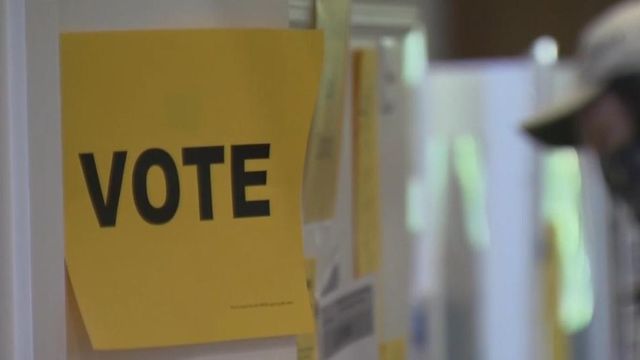NC needs more elections staff for 2024, top official tells lawmakers in voter ID update
Approximately one in every three counties in North Carolina will have its 2024 elections led by someone who has never handled a presidential election before. It's causing concerns for state elections director Karen Brinson Bell.
Posted — UpdatedHundreds of people had their ballots thrown out in the primary election last month because of the state’s new voter photo identification law, state Elections Director Karen Brinson Bell told lawmakers Wednesday.
But in all, she added, 99.93% of voters were able to cast a ballot with no ID-related issues — continuing a trend that began in the 2023 municipal elections, the first to use the new voter ID rules, when the state also reported relatively few problems with voter ID.
The law could still be blocked ahead of the general election this November, however. A federal lawsuit challenging the new voter ID rules as racially discriminatory will go to trial next month.
Of the 1.8 million people who voted in the primary, Bell said Wednesday, about 1,200 lacked an ID. Under state law they were allowed to cast provisional ballots, which would be counted only under certain circumstances — for instance if they could return to an elections office later with an ID, or fill out a form explaining why they didn’t have an ID. Just over 700 of those 1,200 people eventually had their ballots fully or partially counted.
Sen. Amy Galey, R-Alamance, said she supports voter ID and was glad that most people who came to vote in the primaries had no problems with the new rules.
Bell said her office spent $100,000 on advertising efforts to educate the public about the new ID rules during the primary, and she plans to spend over $700,000 more on similar efforts between now and the November general election.
But one area where she needs more funding, she said, is for staffing. A new legislative session starts next week with a primary goal of updating the state budget. Bell reiterated her need for more elections officials to handle tasks ranging from cybersecurity to the nitty-gritty work of carrying out elections.
Due in part to rising levels of harassment aimed at elections officials, Bell said, North Carolina has seen 60 county elections directors leave office since 2019. The state has 100 counties. This year, approximately one in every three counties statewide will have its elections led by someone who has never handled a presidential election before, Bell added. She said the state elections office needs more workers who will be able to fill in at the county level this fall in case of problems, and who could help county-level officials troubleshoot any issues that might arise before, during or immediately after the elections.
Lawmakers raised a series of questions for Bell during Wednesday’s hearing, including:
- Early voting timeline change: Bell was asked about a letter the North Carolina Republican Party sent Tuesday, accusing the elections board of playing politics with the timeline for counties to choose early voting sites by moving it up. Bell said it was simply meant to give local governments more time to find sites. Many early voting locations are in community centers and gyms, but she said there have been some problems in the past with waiting too long to try to reserve those spaces: “We are finding that counties are not able to give substantial notice to some of these facilities, and rec facilities are having to choose between voting, or pickleball,” she said.
- County budget issues: Elections are funded by counties, not the state, and not all of them planned for there to be a runoff election this year for the primary, said Sen. Ralph Hise, R-Mitchell. He wondered if some could slash early voting availability to save money, especially given that turnout in the runoff is expected to be low.
- Signature matching obstacles: A new state law last year ordered a 10-county pilot program for signature matching on absentee ballots. But the state still hasn’t been able to find a vendor that can do the work in the timeframe lawmakers ordered, Bell said.
- AI concerns: Bell said part of the worry about artificial intelligence isn’t just deepfake ads, or bad actors using robocalls to spread misinformation, but also unintended consequences of people using AI platforms in place of more traditional internet searches. She said she did a test, asking five AI platforms to describe the state’s new voter ID laws, and four of the five gave incorrect information. WRAL reported last month that the legislature has so far been uninterested in addressing AI-in-elections issues, but on Wednesday Rep. Pricey Harrison, D-Guilford, told Bell that “a lot of us are concerned.”
- Voter fraud conspiracies: Earlier this month the State Board of Elections’ political members, Republicans and Democrats, voted unanimously to deny a complaint by an “election integrity activist” who had claimed she had proof of voter fraud. State officials investigated and found her allegations were was based on bad data. On Wednesday Sen. Paul Newton asked Bell for an update on that, and Bell said — as WRAL reported one of the board members had also said during the hearing — that one of the best ways for North Carolina to determine if actual voter fraud is happening would be to join a national data-sharing group called ERIC. But the group has been the subject of conspiracy theories in some conservative circles, and the most recent state budget banned ERIC membership here. On Wednesday Rep. Dennis Riddell, R-Alamance, told Bell that ERIC will remain off limits for North Carolina. He’s vice chair of the elections oversight committee she was testifying in front of.
Copyright 2024 by Capitol Broadcasting Company. All rights reserved. This material may not be published, broadcast, rewritten or redistributed.






